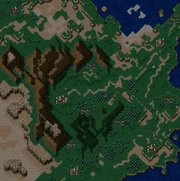
The Country of Isaac
The Kingdom of Isaac is an eastern country of Jugdral that was founded by the Swordmaster Odo in Gran calendar year 648. It was ruled by King Mananan during the events leading up to Fire Emblem: Seisen no Keifu. It was ruled by his grandson Shanan after the events of the game. Isaac is known for being the land of Swordmasters. With the exception of Rivough, Isaac was not involved in the Loptous related child massacre.
History
The Kingdom of Isaac was founded by Odo, the crusader of swordfighting.
In Gran Calendar Year 757, the onset of Fire Emblem: Seisen no Keifu, Rivough barbarians besieged Darna, with reports of massacre. Public outcry emerged in Grandbell to the point that Prince Kurth of Grandbell blamed Isaacian royalty and declared that Grandbell would invade Isaac.
King Mananan was journeying to explain to Prince Kurth that Isaacian royalty was not involved in Rivough's siege on Darna, but he was assassinated by Duke Reptor under Manfroy's influence. That outraged the Isaacian people, and in response, Mananan's son Mariccle waged a full-scale war against Grandbell.
Mariccle ordered that his half-sister Ira and his son Shanan go into exile into Verdane to avoid the suffering they would have to go through if Isaac lost the war. Grandbell's military might was far beyond that of Isaac. The Isaacian-Grandbellian war ended with Mariccle's assassination, followed by Prince Kurth's assassination, during Chapter 2 of Seisen no Keifu.
During the 17 year intermission after the Battle of Barhara, Isaac was conquered by Grandbell and was left to be ruled by House Dozel and Danan as a result of the Isaacian-Grandbellian war. During the intermission, Isaac Castle was run by Johan, Sophara Castle was run by Johalva, Ganeishire Castle was ruled by the Dozel general Harold, and Danan ruled from Rivough Castle. During this time of Danan's rule, the people of Isaac had their status lowered to that of slaves; however, due to the kind nature of his younger sons Johan and Johalva, only Danan enforced the cruel Child Hunts. In the city of Tilnanogue, meanwhile, Adean raised young Prince Seliph alongside her own kids Rana and Lester and other sons and daughters of the Grandbellian army leaders.
In Chapter 6, the rebel army led by Seliph liberates Isaac from Danan's tyrannical regime on Shanan's behalf. The citizens of Isaac detest the Grandbellian Empire for having excessive power and meddling in Isaacian royalty's affairs, but they warm up to Seliph. Isaac is the first country to be liberated by the liberation army.
Geographical Location
In Relation to Other Regions
Isaac is the northeasternmost country in Jugdral. It is located east of Silesia and north of Manster. The Yied Desert is between Isaac and Grandbell. On the opposite corner of Jugdral is Verdane.
Inside Isaac
Isaac is also the name of the capital city located in southern Isaac. The other cities include Tilnanogue and Ganeishire in northern Isaac, and Sophara and Rivough in southern Isaac. King Mananan's children Mariccle and Ira, and his grandson Shanan are from the city of Isaac. Holyn the gladiator is from Sophara. Seliph, Lana, Lakche, and Skasaher were raised in Tilnanogue. Galzus and Mareeta are from Rivough.
Characters from Isaac
Heroes
- Odo, the crusader of swordfighting
Royal Family of Isaac
Tilnanogue
Sophara
- Holyn, the gladiator
Rivough
- Galzus, from Fire Emblem: Thracia 776
- Mareeta, from Fire Emblem: Thracia 776
Ending
If Shanan survives the war against the Grandbell Empire, he will assume the Isaacian throne. If Shanan is dead, Skasaher will assume the Isaacian throne. If both Shanan and Skasaher are dead, Lakche will assume the Isaacian throne unless she has a lover. If Shanan, Lakche, and Skasaher are all dead, or if both Shanan and Skasaher are dead and Lakche has a lover, Seliph will assume the Isaacian throne.
Etymology
In Genesis, a book of the the Judeo-Christian Bible, Isaac is the second son of the patriarch Abraham from whom the twelve tribes of Israel are said to be descended. He is also identified in Genesis as being the son who God asked Abraham to sacrifice as a test of his obedience. At the last second, God stopped Abraham from sacrificing Isaac, acknowledging that Abraham was willing to give up his only son to Him.
